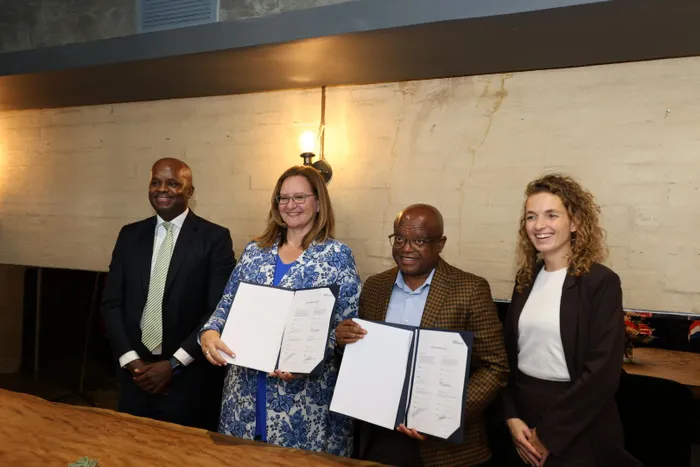Johannesburg secures R550 million international grant for waste-to-energy project
RENEWABLE ENERGY

From left: Mohale Rakgate, chief investment officer from the Infrastructure Fund; Minister of Foreign Trade and Development Cooperation in Netherlands , Aukje de Vries, and Johannesburg Mayor Dada Morero.
Image: Supplied
The Infrastructure Fund, a partnership between the Development Bank of Southern Africa (DBSA), National Treasury and Infrastructure South Africa, has secured a R550 million grant from Dutch-based Invest International to support the rollout of the City of Johannesburg’s landmark Alternative Waste Treatment Technology (AWTT) Project.
Valued at approximately R5.7 billion, the AWTT Project represents a major step in South Africa’s shift towards sustainable waste management and renewable energy generation.
Implemented as a public-private partnership (PPP) between the Infrastructure Fund, the City of Johannesburg (CoJ) and private-sector partners, the initiative aims to divert about 500 000 tons of municipal solid waste per year — around 31% of the city’s annual waste — away from landfill sites.
At the heart of the project will be a dirty Materials Recovery Facility (dMRF) and a Waste-to-Energy (WtE) plant that will be designed, built, financed, operated and maintained by the private sector over a 25-year concession period. Ownership of the facilities will revert to the City at the end of the agreement.
By converting residual waste into energy, the project is expected to generate around 28 megawatts (MW) of electricity — enough to power 60 000 households — while recovering and recycling up to 175 000 tons of waste annually.
This is expected to help extend the lifespan of landfill sites, curb methane emissions, and align Johannesburg’s waste systems with international environmental and emissions standards.
The AWTT Project forms part of a broader strategy to promote circular-economy principles and climate-resilient infrastructure in South Africa’s urban centres.
Its blended-finance model — combining public, private and concessional funding — demonstrates how partnerships can deliver large-scale infrastructure off municipal balance sheets, unlocking both economic and environmental value.
The R550 million grant from Invest International, provided on behalf of the Netherlands’ Ministry for Foreign Trade and Development Cooperation, will help fast-track the project’s implementation, reduce operational costs through lower gate fees, and move the initiative to the procurement phase for the appointment of a preferred bidder.
Mohale Rakgate, chief investment officer at the Infrastructure Fund, said Thursday that the Fund continues to demonstrate how innovative financing structures can address municipal infrastructure challenges at scale.
“This project not only supports Johannesburg’s waste management and energy needs but also illustrates how blended finance can unlock transformative, sustainable solutions for South Africa’s cities,” he said.
Rakgate added that the DBSA and its partners would continue to work with municipalities nationwide to “find sustainable solutions that serve generations to come.”
Johannesburg Mayor Dada Morero welcomed the grant, saying it will help the City promote recycling, extend landfill lifespans, and comply with international climate commitments.
“The City of Johannesburg appreciates this funding milestone from Invest International, as it will assist the City in promoting waste hierarchy through recycling, diverting municipal solid waste to a waste-to-energy facility, and generating energy for residents while meeting COP27 emissions standards,” Morero said.
Dutch Minister for Foreign Trade and Development Cooperation, Aukje de Vries, said the Kingdom of the Netherlands was proud to support sustainable economic development in South Africa through the AWTT Project.
“The Netherlands is proud to contribute to the sustainable economic development of South Africa, specifically the City of Johannesburg, through this flagship project,” she said.
Officials say lessons from the Johannesburg initiative will guide similar projects in other municipalities grappling with waste-management and energy challenges.
The AWTT Project, they added, sets a precedent for using concessional finance and private-sector participation to deliver critical urban infrastructure within tight fiscal constraints — while helping South African cities transition toward a cleaner, more resilient future.
BUSINESS REPORT